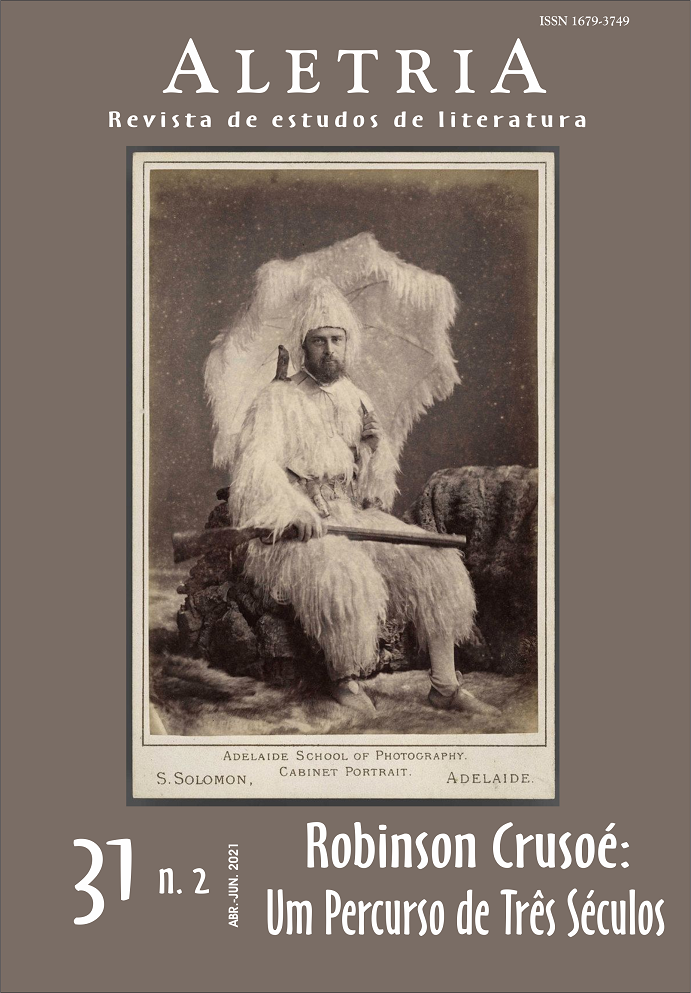Outras ilhas, outros desertos
a virada negativa dos espaços desabitados
DOI :
https://doi.org/10.35699/2317-2096.2021.26288Mots-clés :
distopia, narrativas pós-apocalípticas, Robinson Crusoé, A ilha do Dr. Moreau, A estradaRésumé
O espaço desabitado desempenha um papel importante no imaginário moderno. Seu fascínio deriva do maravilhamento dos primeiros viajantes europeus a entrarem em contato com o Novo Mundo, e ele encontra uma de suas manifestações mais paradigmáticas na ilha deserta de Robinson Crusoé. Originalmente um espaço de abundância em que o indivíduo encontra uma oportunidade aparentemente ilimitada de se expandir, ele surge, no final do século XIX, como um território controlado e sombrio, de contornos distópicos. Neste artigo, discuto de que modos se dá essa virada negativa do espaço desabitado, primeiro em A ilha do Dr. Moreau (1896), de H. G. Wells, e depois no romance pós-apocalíptico A estrada (2006), de Cormac McCarthy. Desse modo, pretendo mostrar como a imagem do espaço desabitado se apresenta em diferentes momentos da modernidade e como ela está ligada à maneira como pensamos nossa posição no mundo.
Références
ARMSTRONG, Nancy. How Novels Think: The Limits of Individualism from 1719-1900. Nova York: Columbia University Press, 2005.
BOOKER, M. Keith. The Dystopian Impulse in Modern Literature: Fiction as Social Criticism. Westport, CT: Greenwood Press, 1994.
BOTTING, Fred. Gothic. Londres: Routledge, 2005. DOI: https://doi.org/10.4324/9780203993767.
CLAEYS, Gregory. The Origins of Dystopia: Wells, Huxley and Orwell. In: ______. The Cambridge Companion to Utopian Literature. Cambridge: Cambridge University Press, 2010. p. 107-131. DOI: https://doi.org/10.1017/CCOL9780521886659.005.
DEFOE, Daniel. Robinson Crusoe. 2. ed. Nova York: W. W. Norton, 1994. (Norton Critical Edition).
DOWNIE, Alan. Robinson Crusoe’s Eighteenth-Century Contexts. In: SPAAS, Lieve; STIMPSON, Brian (org.). Robinson Crusoe: Myths and Metamorphoses. Basingstoke, UK: Palgrave Macmillan; Nova York: St. Martin’s Press, 1996. p. 13-27. DOI: https://doi.org/10.1007/978-1-349-13677-3_2.
FRANÇA, Júlio. O Gótico e a presença fantasmagórica do passado. In: ENCONTRO ABRALIC, XV., 2016, Rio de Janeiro. Anais [...]. Rio de Janeiro: Dialogarts, 2016. v. 1, p. 2492-2502.
FUCHS, Barbara. Conquering Islands: Contextualizing The Tempest. In: SHAKESPEARE, William. The Tempest. Nova York: W. W. Norton, 2004. p. 265-285. (Norton Critical Edition).
GREENBLATT, Stephen. Marvelous Possessions: The Wonder of the New World. Chicago: The University of Chicago Press, 1991. DOI: https://doi.org/10.7208/chicago/9780226306575.001.0001.
HICKS, Heather J. The Post-Apocalyptic Novel in the Twenty-First Century: Modernity Beyond Salvage. Basingstoke, UK: Palgrave Macmillan, 2016. DOI: https://doi.org/10.1057/9781137545848.
HURLEY, Kelly. The Gothic Body: Sexuality, Materialism, and Degeneration at the fin de siècle. Cambridge: Cambridge University Press, 1996. DOI: https://doi.org/10.1017/CBO9780511519161.
MCCARTHY, Cormac. A estrada. Tradução de Adriana Lisboa. Rio de Janeiro: Objetiva, 2007. E-book.
MCCARTHY, Cormac. The Road. Nova York: Alfred A. Knopf, 2006.
PUNTER, David. The Literature of Terror: The Gothic Tradition. 2. ed. Londres: Routledge, 2013. v. 1.
PUNTER, David; BYRON, Glennis. The Gothic. Malden, MA: Blackwell, 2004.
SARGENT, Lyman Tower. The Three Faces of Utopianism Revisited. Utopian Studies, [S.l.], v. 5, n. 1, p. 1-37, 1994. Disponível em: http://www.jstor.org/stable/20719246. Acesso em: 30 nov. 2010.
SCHÄFER, Martin. The Rise and Fall of Antiutopia: Utopia, Gothic Romance, Dystopia. Science Fiction Studies, [S.l.], v. 6, n. 3, p. 287-295, 1979. Disponível em: http://www.jstor.org/stable/4239285. Acesso em: 21 jun. 2014.
SHAKESPEARE, William. The Tempest. Nova York: W. W. Norton, 2004. (Norton Critical Edition).
SHOWALTER, Elaine. The Apocalyptic Fables of H. G. Wells. In: STOKES, John (org.). Fin de Siècle/Fin du Globe: Fears and Fantasies of the Late Nineteenth Century. [S.l.]: Palgrave Macmillan, 1992. p. 69-84. DOI: https://doi.org/10.1007/978-1-349-22421-0_5.
THACKER, Eugene. In the Dust of This Planet: Horror of Philosophy. Winchester, UK: Zero Books, 2015. v. 1. E-book.
VASCONCELOS, Sandra Guardini. Robinson Crusoe in the South Atlantic. Aletria: Revista de Estudos de Literatura, Belo Horizonte, v. 31, n. 2, 2021.
WATT, Ian. The Rise of the Novel: Studies in Defoe, Richardson and Fielding. Harmondsworth, UK: Penguin, 1972.
WELLS, Herbert George. The Island of Dr. Moreau. Nova York: Bantam, 1994.
Téléchargements
Publiée
Numéro
Rubrique
Licence
(c) Copyright André Cabral de Almeida Cardoso (Autor) 2021

Ce travail est disponible sous la licence Creative Commons Attribution 4.0 International .
Authors who publish with this journal agree to the following terms:Authors retain copyright and grant the journal right of first publication with the work simultaneously licensed under a Creative Commons Attribution Non-Commercial No Derivatives License that allows others to share the work with an acknowledgement of the work's authorship and initial publication in this journal.Authors are able to enter into separate, additional contractual arrangements for the non-exclusive distribution of the journal's published version of the work (e.g., post it to an institutional repository or publish it in a book), with an acknowledgement of its initial publication in this journal.Authors are permitted and encouraged to post their work online (e.g., in institutional repositories or on their website) prior to and during the submission process, as it can lead to productive exchanges, as well as earlier and greater citation of published work (See The Effect of Open Access).





